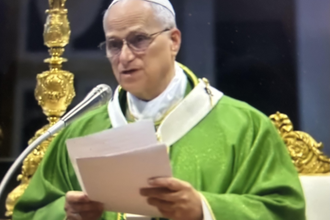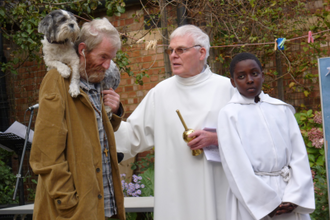Pope celebrates birthday with release of book extracts

Image Vatican Media
Source: Vatican Media
Happy Birthday Pope Francis!
To mark his 88th birthday today, Pope Francis has released several excerpts from his autobiography 'Hope', recounting his childhood in Buenos Aires slums and the logistical difficulties of his 2021 visit to Iraq.
Written with Carlo Musso and published by Italian firm Mondadori, the book will be released on January 14 in over 100 countries.
Two Italian newspapers 'La Repubblica' and 'Il Corriere della Sera' published a few excerpts today.
"When someone tells me I am a villero (shantytown dweller) Pope, I pray to be worthy of it," says Pope Francis, as he recalls the "complex, multiethnic, multireligious, and multicultural microcosm" of the Flores barrio in Buenos Aires, where he spent his childhood.
"Differences were normal, and we respected each other," he says, pointing to his relationships with Catholic, Jewish, and Muslim friends.
Pope Francis tells of his childhood experiences of seeing prostitutes on the streets of Buenos Aires, calling it an image of the "darkest and most difficult side of existence."
As a bishop, he celebrated Mass for some of these women who had reformed their lives.
He recalls one woman, named Porota, telling him: "I've worked as a prostitute everywhere-even in the United States. I earned money, then fell in love with an older man who was my lover. When he died, I changed my life. I have a pension now, and I go to bathe elderly people in nursing homes who have no one to care for them. I didn't go to Mass much, and I did everything with my body, but now I want to care for the bodies no one else is interested in."
Pope Francis calls her a "contemporary Magdalene." Porota called him one last time, from the hospital, just before dying, to receive the Anointing of the Sick and Communion.
"She died well - like 'the tax collectors and prostitutes' who 'precede us in the kingdom of God' (Mt 21:31). I loved her dearly. Even now, I never forget to pray for her on the day of her death," he writes.
The Pope recalls the prisoners who made clothing brushes, and recounts his friendship with Father José de Paola, known as "Father Pepe", pastor at Virgen de Caacupé in Villa 21. The Pope, then Jorge Mario Bergoglio, supported Father Pepe through a vocational crisis.
Speaking about those liminal areas where "the State was absent for 40 years" and drug addiction is "a scourge that multiplies despair," the Pope affirms that "in these peripheries, which the Church must increasingly make its centre, a group of lay people and priests like Father Pepe live and witness the Gospel every day, among those discarded by a killing economy."
From these harsh realities emerges the truth that religion, as some claim, "is not the opium of the people, a comforting story to alienate individuals," the Pope insists.
On the contrary, he says, "It is thanks to faith and that pastoral and civil commitment" that the villas "have progressed in unimaginable ways, despite enormous difficulties." Just like faith, "every service is an encounter, and we especially can learn much from the poor."
From the drama of urban outskirts to the devastation of Iraq, Pope Francis' gaze remains fixed on a wounded humanity.
Reflecting on his historic Apostolic Journey to Iraq, on March 5-8, 2021, Pope Francis describes the "arrow to the heart" represented by Mosul.
"One of the world's oldest cities," he says, "overflowing with history and traditions, which had seen different civilizations come and go and was a symbol of peaceful coexistence of diverse cultures in one country-Arabs, Kurds, Armenians, Turks, Christians, Syriacs-appeared to my eyes as a field of rubble after three years of occupation by the Islamic State, which had chosen it as its stronghold."
Viewed from a helicopter, he says the territory looked like "an X-ray of hatred, one of the most effective sentiments of our time."
The Pope recalls the visit's difficult context, exacerbated by the COVID-19 pandemic and security concerns.
"I was advised against going by almost everyone… but I felt I had to," he writes, referring to the land of Abraham, "the common ancestor of Jews, Christians, and Muslims."
He mentions a warning from British intelligence about two assassination attempts that had been planned during his visit to Mosul: one by a woman strapped with explosives, another involving a truck.
Both attackers were intercepted and killed by Iraqi police. "This struck me deeply," Pope Francis emphasizes. "It was also a poisoned fruit of war."
In all this hatred, however, the Pope found a light of hope in his March 6 meeting with Grand Ayatollah Ali al-Sistani in Najaf, an encounter that "the Holy See had prepared for decades."
Held in a spirit of fraternity in al-Sistani's home, it was "a gesture eloquent in the East, even more than declarations or documents, as it signifies friendship and belonging to the same family," the Pope explains. "It did my soul good and made me feel honoured."
He recalls the Ayatollah's joint appeal to the great powers "to abandon the language of war, prioritizing reason and wisdom." The Pope expresses appreciation for a phrase from their meeting: "Human beings are either brothers in religion or equals in creation."
In addition to 'Hope' Pope Francis' life will also be recounted in a film based on Life: My Story in History, an autobiography written with Fabio Marchese Ragona and published in March by HarperCollins.


















